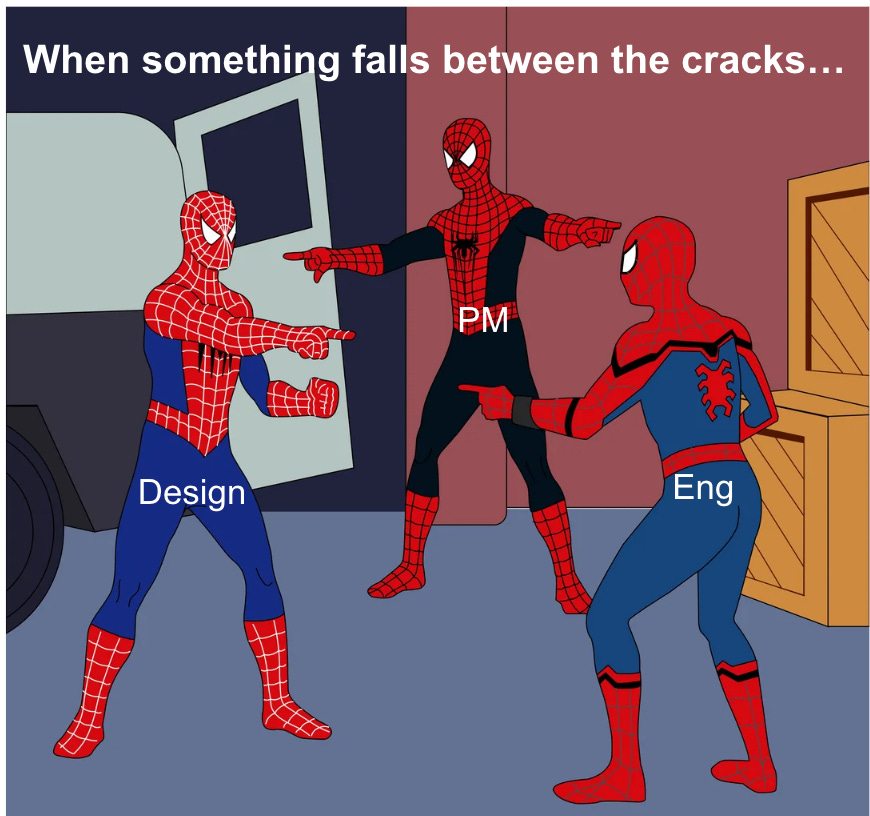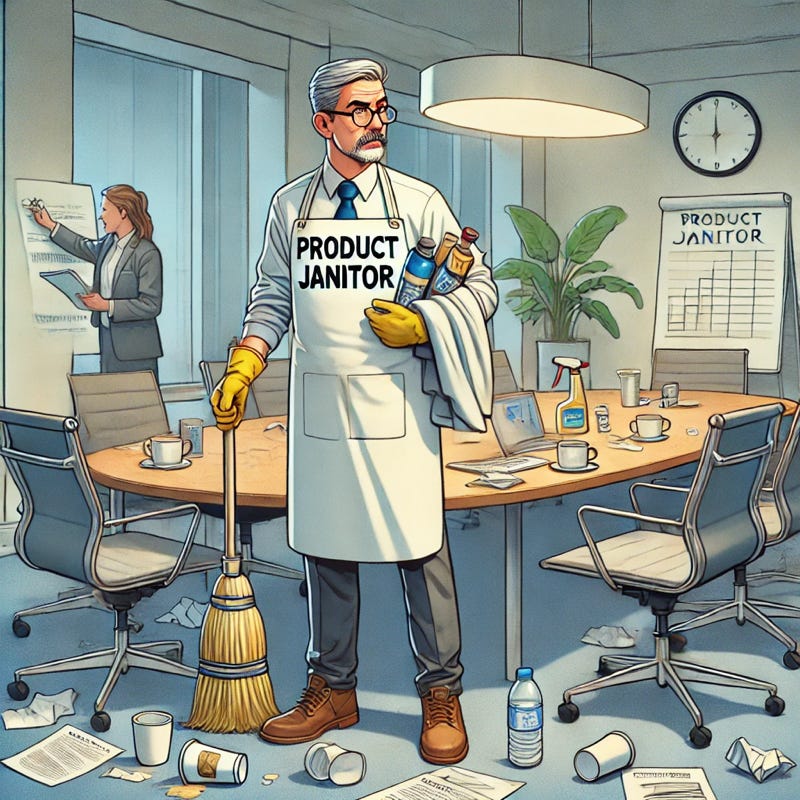Re: That's not my job
Letters to a young product manager (2nd letter)
Letters to a young PM is a series of writings directed at someone early in their product career right now. This is the second letter in the series
That’s not my job
Hi Luke -
Thank you for such a kind and insightful letter, I appreciate it. I’ve taken your advice and I’m spending more time learning new technologies and getting out of zooms and meetings. Most importantly, I make time to be with myself, free of distraction, so that I can explore depth itself to discover new inspiration.
Recently, I’ve been caught in a few situations where my team suffers from setbacks. To be blunt, it’s because there are some people who are coming up short on their responsibilities and things fall through the cracks. As the PM, I find myself doing everything I can to plug all these gaps, but I’m getting burnt out!
When I talk to friends, they mention similar situations where they feel like they have to catch the balls that other people drop. And then they don’t actually get to do product work because they’re too busy and exhausted trying to keep things running.
I’m going far beyond my responsibilities, but I’m afraid to come out and say “thats not my job.”
Have you ever experienced this? What are your thoughts?
Best,
Chris
Re: That’s not my job
Chris,
Fantastic to hear from you once more. I’m glad to hear that you’re dedicating and blocking time to go deep into your product work. This is the meaningful work that we PMs bring to the table. As you know, we don’t code, design, or sell.
Product management is a craft that often leaves us in the invisible, invaluable space between code, design, and business strategy. It’s where we listen to whispers in the depths and translate them into tangible impact.
Whose job?
Regarding your situation, this is a familiar space. This you must understand - all high caliber PMs have mastered the art of skillfully saying “that’s not my job.”
Every product manager faces a constant struggle between high-leverage strategic work and the chaos of execution. Learning how to navigate that tension is what defines great product leadership. You want to do the high leverage work such as strategy, complex problem solving, and connecting with customers. However, tedious execution often demands attention.
Ultimately, a product leader’s role is to get the job done, sometimes even as the team’s janitor—cleaning up after everyone so the team can move forward. Moreover, we PMs carry the anxiety for the team. We keep an vigilant eye on everything so we can identify and mitigate risks that prevent success.
Earlier in your career, it’s important to capture these opportunities to learn about what it takes to deliver a high quality product. This also gives you insight to how other teams work, their incentives, and how to better speak their language.
As you progress, however, it’s important to think not only about getting the job done in any way possible, but also how to build in a way where the team grows over time. Products are not built overnight, they bloom over seasons and release cycles. No single release will make a product, so it’s a fools errand to burn everyone out for just a single release.
Great product leaders build teams that grow stronger over time, cultivating autonomy and accountability rather than dependency. These are teams where you’ll rarely hear anyone say “that’s not my job.”
How to make this happen? Understand leverage and priority. In every release cycle, there’s no shortage of tasks. The best PMs understand which problems demand attention today and are the ones that will promote long-term success. It matters a lot more to stay attuned to your customers and solve the few thorny problems than it does to make sure all the JIRA tickets are groomed.
Once you’ve earned your team’s respect, you’ll be surprised at how they respond when you challenge them to do more. And you’ll be inspired to see how the team operates better when everyone sees their teammates picking up slack. Leaders bring out the best in their team, not just by setting an example, but by working with each person to develop them to be their best.
Earning respect
Now, you cannot challenge your team to step up without their respect. Too often, I’ve heard engineers and designers lament “PMs who add no value, but get in the way.” There are PMs so concerned with sounding smart that they prematurely spout out half-baked buzz words; people can see through those ruses. Do not be one of these PMs.
Instead, earn respect by giving it. Ask questions, genuinely listen, and understand perspectives across all disciplines… engineering, design, sales, etc. Fully educate yourself and formulate your opinions. Go deep at every chance. Have a strong opinion backed by evidence and data, but hold it lightly so there’s space for new discoveries and iterations.
Once you’ve earned respect, challenge your team to do more. Let them fail, learn, and grow. This is how resilience is built. Demonstrate the importance of consistent, disciplined work in the every day - lead by example and your team will follow.
This is how PMs lead more deeply than simply generating artifacts like PRDs or PowerPoints. This is how PMs make magic happen, at the intersection of strategy, execution, and teamwork.
Closing thoughts
Master the art of honest work that earns respect, and the balance between stepping in and stepping back. Your impact will grow exponentially, and your team will flourish without leaning on you as a crutch. It will be more resilient to changes in the organization or the market, able to take on any challenge in front it.
The greatest success of a product manager isn’t just in the products they build but in the teams they empower to thrive, adapt, and create.
I look forward to hearing how you employ these learning and skills, Chris. Don’t be a stranger!
Warmly,
Luke



